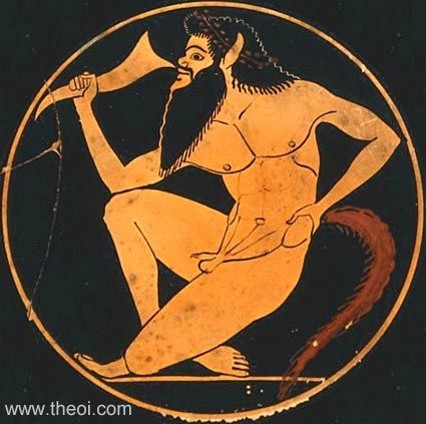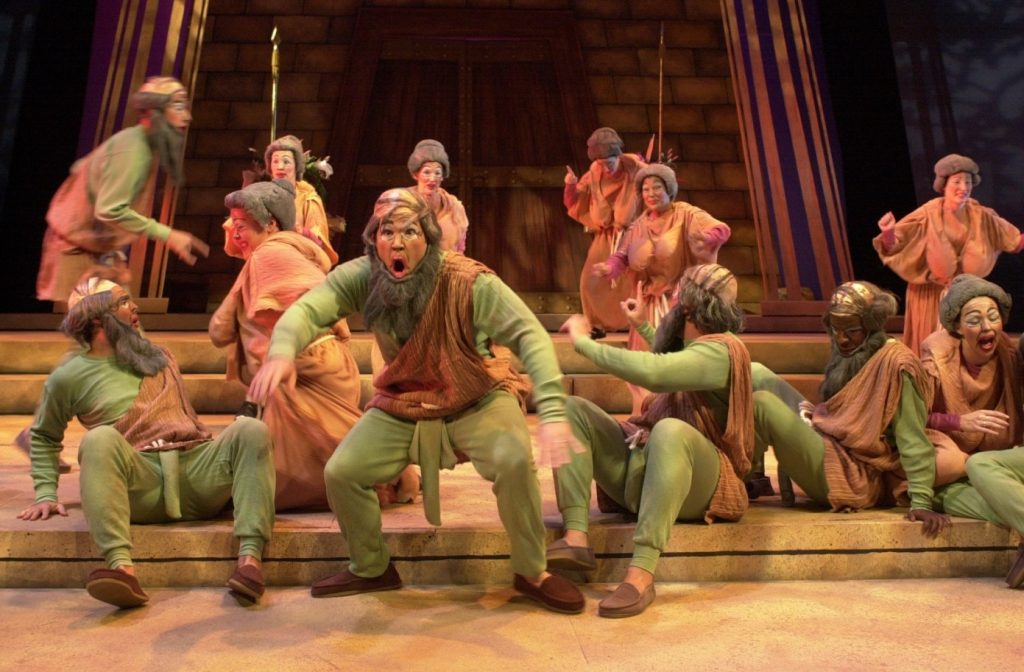Last week I focused on the Tragic competition at the Dionysia. (You can read this here.) There was also a Comic competition in which five single plays by five different playwrights were judged, but first, let’s look at a comic play which was part of the tragic competition (this is not a joke!).
At the Dionysia festival, each trilogy of tragic plays was followed by a satyr play, so called because their choruses were made up of actors dressed as satyrs. Satyrs were small rustic creatures, half-goat, half-human, and often comically grotesque.

What was a Satyr play? These plays included elements such as
- Captivity, servitude and liberation of the satyrs
- Marvellous inventions and creations
- Emergence from the underworld and resurrection
- The care of divine or heroic infants
- Sex
- Athletics
- Slapstick
Satyr plays had mythological plots with mythological travesty a principal source of humour, their language was in the same metre as tragedy, and they occasionally parodied the preceding tragedies. In comparison with the preceding tragedies, the satyr play was short, for example, the only surviving satyr play, The Cyclops by Euripides is 700 lines, compared with 1300 lines upwards of a tragedy.
Euripides’ satyr play is a parody of the tale in Odyssey 9 where Odysseus and his men meet the Cyclops. The satyr play introduced satyrs into this story:
Odysseus meets satyrs who tell him about the cyclops. The satyrs try to sell him the cyclops’ goats. The cyclops appears and eats some of Odysseus’ men. The satyrs help Odysseus escape from the cyclops’ cave by suggesting they get him drunk and blind him with a hot stake, taking the glory from Odysseus.
Now to the comic playwrights. The Dionysia festival now moved from the subject matter of myth, and performances which did not acknowledge the presence of the audience, to a contemporary comic world where actors and chorus handled issues of the day: intellectual, political, social, literary. Both the audience and characters were the butt of the jokes and language was as obscene as the action. Common jokes were toilet humour and sex.
Comic playwrights are divided into Old comedy (450-380): Aristophanes and his predecessors. We have the names of 50 comic playwrights but only complete plays (11) by Aristophanes (445-385). His first was Acharnians (425) and last Wealth (388). Middle Comedy (380-320): no surviving plays. New Comedy (320 onwards): Menander.
Aristophanes’ Frogs satirises the quality of Athenian tragedy. It was staged in 405BC at the Lenaia festival and awarded first prize.
Historical background: At the time that Aristophanes staged the play, Athens was losing the Peloponnesian War (431-404 BC) to Sparta. A year later (404 BC), Athens surrendered after the destruction of its naval fleet. Aristophanes attributed the decline of Athens to ineffective leadership, weakened freedom of speech, the bellicosity of the Athenian empire, and rejection of traditional values. In earlier times, Aristophanes says, the great playwrights Sophocles, Aeschylus, and Euripides wrote and staged tragedies that called attention to the failings of society and showed the people how to turn these failings into successes. But these playwrights were all dead by 406 BC. Thus he had his idea for The Frogs: to go to Hades to bring back to earth a playwright who will save Athens with the wisdom he imparts in his tragedies.

The Frog Chorus: The Chorus of Initiates (of Iacchus the deity worshipped in Eleusis) was the principal chorus. The chorus of frogs is invisible (or so it has been thought since antiquity). Economic burden of costuming two choruses might be too much at a time when the cost of war (loss, damage, taxation) was extremely high. Charon tells Dionysus that he will hear the chorus of frogs, not see them, and the lyric dialogue between Dionysus and the frog chorus refers to their sound not their colour or appearance. On the other hand, would the play be named after a chorus which was not even seen? After all, plays named after animals or insects (e.g., Wasps, Birds) were traditional and visibility might not have been necessary.

